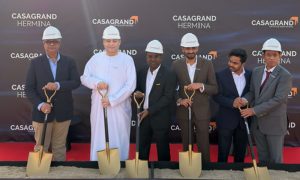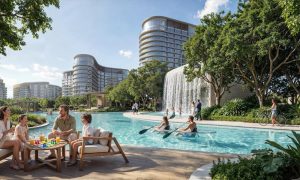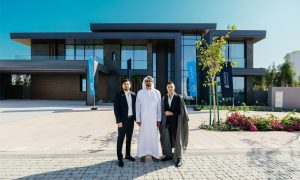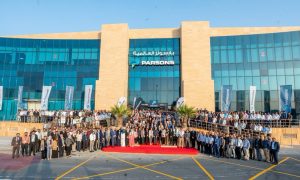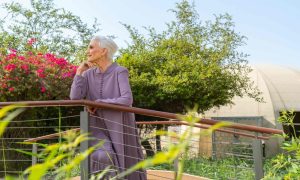Is Partanna’s cement alternative the key to carbon negative projects?
Partanna Founder Rick Fox says his firm has already signed agreements with the Government of the Bahamas and Red Sea Global

As greenhouse gas emissions (GHGE) continue to choke the planet and contribute to global warming and – ultimately – climate change, the built environment is under mounting pressure to meet obligations, while reducing its impact on the environment in line with stricter government regulations.
Reports from several industry bodies including the World Green Building Council indicate the built environment is responsible for 39% of global energy related carbon emissions. Drilling down into that figure, 28% comes from operational emissions, from energy needed to heat, cool and power structures, and the remaining 11% from materials and construction.
Addressing these issues is of paramount importance in the fight against global warming and climate change, and firsthand experience of growing extreme weather is what spurred actor and former NBA player Rick Fox to launch ‘Partanna’ and develop its advanced new building material. The material is said to minimise carbon emissions and remove carbon from the atmosphere.
Speaking to Middle East Construction News (MECN) about the inspiration behind Partanna, Fox says, “Growing up in the Bahamas, tropical storms were a constant in my childhood. With each storm increasingly stronger, I witnessed first-hand the devastating housing crisis that emerged in the wake of Hurricane Dorian. In California, with more frequent and widespread wildfires, my co-founder Sam Marshall saw his home seriously damaged in the Malibu Wolsey Fire. It was in the height of the pandemic, when we first met and shared our stories.”
“With the pandemic exposing the rapid impact of tragedy on a global scale, we realised the same dramatic impact of climate change. Refusing defeat and inspired to create change, we turned the power of that impact around for the good. For almost two years, Sam and a team of scientists worked on the formula. Then came an opportunity in my home country for the new technology to be applied on the front lines of the war on climate change in the Bahamas.”
In early November 2022, at COP27, Partanna Bahamas and the Government of the Bahamas announced their intent to develop the “world’s first carbon-negative affordable housing development”.

Fox points out, “Partanna is a building material that not only minimises carbon emissions, but also removes carbon from the atmosphere. Indicatively, a typical 1,250sqft home made with cement emits 70.2t of CO2. In contrast, a typical 1,250sqft home made with Partanna is carbon negative, absorbing 22.5t of CO2.”
Discussing what certifications the material has received to date and what certifications, it is aiming for going forward, Fox explains, “Partanna’s building material has now been listed by Verra, the world’s largest carbon credits certifier, for its verified ability to remove carbon from the atmosphere and generate tradable carbon credits. In 2022, Partanna was also recognised by the Government of the Bahamas to have met all standards within its Building Code. As we look to expand around the world, our focus will be on achieving similar Building Code approvals in our target markets.”
Following the launch of the Partanna Bahamas development, a MoU between Partanna and Saudi-based developer Red Sea Global (RSG) was also announced at COP27 in November 2022. The deal will see the firms jointly explore carbon-negative concrete developments, and – as part of the agreement – the parties are exploring an arrangement for Partanna to establish production facilities on Saudi Arabia’s Red Sea coast.
Asked about his plans for taking the new material to a broader audience and how his firm intends to engage with industry players, Fox notes, “We are actively exploring a number of projects in the Middle East and Asia, with parties looking to develop large-scale infrastructure and development projects. Our technology is as versatile, durable and adaptable as cement, and manufacturing can be easily scaled. We are breaking ground on a second factory in the Bahamas in 2023, and are actively looking for our next home base.”
“The nearest comparable manufacturers are some distance away from delivering the impact we do. These other technologies inject their product with carbon acquired from carbon removal projects, which themselves are resource intensive. At best, they’re stopping new emissions from occurring, whereas Partanna is actually removing carbon from the atmosphere.”
Fox adds, “We believe that in time, as we continue to build with Partanna, the wider industry will come to see Partanna as an obvious solution to their building needs.”

In terms of the challenges Fox anticipates in the journey to bringing Partanna to built environment stakeholders around the world, Fox states, “Convincing the industry that Partanna is a viable alternative to cement – we hope that the successful delivery of homes in The Bahamas, and our growing project pipeline, will help to evidence the strength of our technology.”
“Establishing local partnerships with third parties to help building codes and manage our supply chain is also on the agenda. We believe that Partanna can be a solution for developers around the world. To scale quickly – we will need to establish partnerships with companies who can support our manufacturing and commercial processes. We want to work with other businesses that share our values and commitment to sustainability throughout their supply chain, so are quickly establishing due diligence mechanisms to ensure the integrity of our relationships.”
Fox says a “great team that can bring Partanna to the world” is a key goal going forward. He remarks, “As a steward of this technology, my job now is to assemble and lead a team that has the energy and expertise to make Partanna available at scale. I believe passionately that our technology can add great value to the construction industry.”
He concludes, “The challenge now is making it abundantly available to anyone who is interested in building in a regenerative way. That means attracting the best talent and motivating them around our vision to change how the world builds. Currently, the construction and manufacturing industries are facing great recruitment challenges – but we believe our purpose can help inspire great people to come and join us on our mission.”
In early December 2022, Louise Collins, Head of Engineering & Energy, MENA at JLL shared her thoughts and takeaways from COP27 exclusively with MECN.

